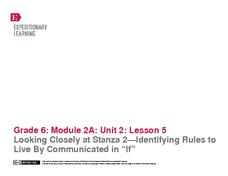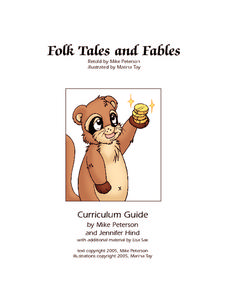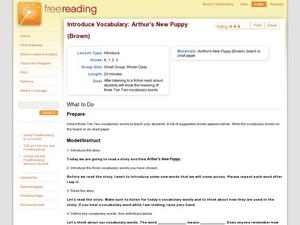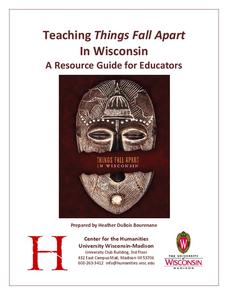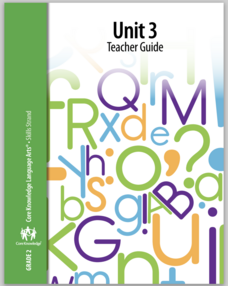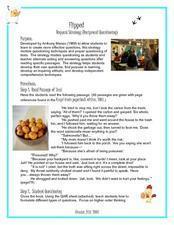College Board
AP® English Language Special Focus: Using Sources
What is the most effective way to teach scholars how to write a research paper? Educators explore the topic with the AP® English Language and Composition exam resource. The reference material guides teachers in best practices for...
EngageNY
Looking Closely at Stanza 2—Identifying Rules to Live By Communicated in “If”
Pupils take part in a close reading of the poem, If by Rudyard Kipling, in which they delve deep into its meaning and identify its rules to live by. As the grand discussion progresses, learners then relate the poem's rules with those...
EngageNY
Looking Closely at Stanza 1—Identifying Rules to Live By Communicated in “If”
Here is a lesson plan in which pupils connect themes and rules to live by from the story Bud, Not Buddy by Christopher Paul Curtis to those found in the poem If by Rudyard Kipling. First, scholars discuss their reading and review Bud's...
MENSA Education & Research Foundation
Magical Musical Tour: Using Lyrics to Teach Literary Elements
Language arts learners don't need a lecture about poetry; they listen to poetry every day on the radio! Apply skills from literary analysis to famous songs and beautiful lyrics with a lesson about literary devices. As...
Weekly Story Book
Folk Tales and Fables
Pages and pages of engaging activities, worksheets, and writing projects on teaching folktales and fables await you! You don't want to miss this incredible resource that not only includes a wide range of topics and graphic...
Curated OER
Zoom Broom
Learners explore comprehension strategies as they listen to Zoom Broom by Margie Palatini. As the story is read, teacher and pupils will stop occasionally to make text-to-text, text-to-self, or text-to-world connections. They also...
Scholastic
Test-Taking Strategies for Three Subject Areas
Sometimes a test page loaded with text can make a student's face go blank. Help them decipher what a text question is asking with a series of tips focused on reading comprehension, vocabulary, and language arts mechanics.
Curated OER
Night: Unsent Letters Writing Strategy
As part of their study of Elie Wiesel's Night, individuals assume the voice of an Auschwitz survivor and craft a letter to a former SS officer who worked at the camp and claims he is not guilty of any crime.
Curated OER
Introduce Vocabulary: Are Trees Alive? (Miller)
Explore the life inside trees as scholars learn vocabulary through Debbie Miller's informational text Are Trees Alive? Familiarize pupils with the new words they will hear like anchor, disease, awaken,...
Curated OER
Introduce Vocabulary: Arthur's New Puppy (Brown)
Learn new words as you read Marc Brown's story, Arthur's New Puppy. This is focused as a vocabulary-in-context activity (though this strategy could be used with any book and set of words). Introduce the new words you will focus on:...
Curated OER
Introduce Vocabulary: Clifford the Big Red Dog (Bridwell)
Clifford the Big Red Dog is here to introduce some new vocabulary terms in context to young readers. Although this activity is designed around Norman Bridwell's picture book, the strategies are applicable for any text. Introduce the new...
K12 Reader
Using Prior Knowledge
Sometimes it's hard to relate to a new text. Teach kids to use their prior knowledge when reading something new with a comprehension exercise. A short passage tells them how to think of their brains like filing systems, and provides five...
Anti-Defamation League
7 Ideas for Teaching Women's History Month
Celebrate Women's History Month with hands on-learning. The resource provides seven strategies to help educators teach Women's History Month, ranging from watching films to reading books written by women. Activities including writing...
University of North Carolina
Book Reviews
Reading goes beyond taking in information—it also involves forming impressions about what we read. Sometimes we share those impressions through book reviews, a specific type of writing outlined in a handout on the topic. Using the...
Curated OER
Charlotte's Web
Fourth graders focus on fluency by reading the book Charlotte's Web. In this reading strategies instructional activity, 4th graders partner read, do guided reading, and independent reading to increase fluency. Students use Venn...
Curated OER
Improving Elementary Reading Literacy
Students enhance their literary skills through phonemic awareness. In this reading development lesson plan, students read several storybooks and analyze the phonetics, vocabulary, and overall story. The students then rewrite what they...
University of Wisconsin
Teaching Things Fall Apart in Wisconsin: A Resource Guide for Educators
“There is no story that is not true, . . .” And uncovering the truths in Things Fall Apart is the focus of a 68-page resource packet designed to provide instructors with a wealth of materials that enhance understanding of Chinua Achebe’s...
Curated OER
Daily Lesson Plan for a Struggling Reader
Strategy-based programs that are executed with consistency are the best for achieving growth in any learner with a learning disability. Here is a seven-step lesson plan that is highly structured and is intended to help learners with...
Core Knowledge Foundation
Second Grade Skills Unit 3: Kids Excel
The unit offers second graders skills practice in tricky spelling and words, grammar—nouns and punctuation, reading decodable texts, and writing a personal narrative. Lessons begin with a warm-up and go into a concept review, word work,...
Core Knowledge Foundation
Third Grade Skills Unit 10: Living in Colonial America
Over three weeks, third graders participate in lessons designed to boost spelling and grammar skills—adjectives, adverbs, and pronouns—and prefixes. Readings are themed to share stories about Colonial America.
Curriculum Corner
Sports Word Work Literacy Pack
Hockey, home runs, and helmets: your next sports-themed reading unit is here! Twelve tasks invite young readers to match unscramble sports words, create categories, count vowels and consonants, mark syllables, alphabetize words in the...
Curated OER
Speak Vocabulary Strategy
A scarlet letter “V” stands for a desktop teaching vocabulary activity designed for Speak. Prior to reading Laurie Hales Anderson’s young adult novel, individuals sign up for a word, design a handout that illustrates the word, includes...
Curated OER
Hiroshima: Question Answer Response Strategy (QAR)
“The crux of the matter is whether total war in its present form is justifiable. . .” After reading “The Aftermath,” the final chapter of Hiroshima, class members use a Question Answer Response (QAR) strategy to reflect on issues raised...
Curated OER
Flipped: Request Strategy
Break your class into groups and have them read certain passages from the text Flipped (included here). After every two paragraphs, the groups stop to answer the questions included. Which questions provided are right there questions?...

